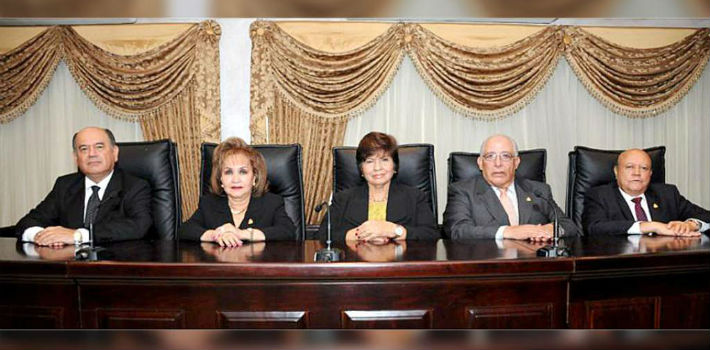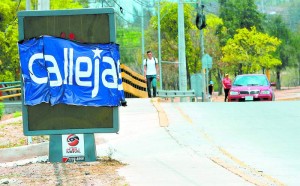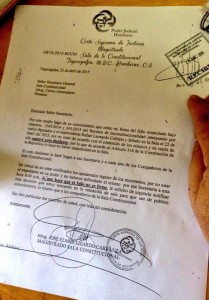
EspañolAfter a six-hour meeting on Thursday, the Constitutional Chamber of the Supreme Court of Honduras revoked two key articles of the Constitution — effectively legalizing presidential reelection in the Central American country.
The Chamber’s decision is in response to two petitions to scrap articles 239 and 240, by former President Rafael Leonardo Callejas (1990-1994) and a group of government congressmen respectively. Article 239 — in force since 1982, and now thrown out by the CSJ — bars the country’s presidents from running for repeat terms.
The text reads: “The citizen who has served as the head of the executive power cannot be president or presidential candidate. He who breaks this disposition or proposes its reform, as well as those who support him directly or indirectly, will cease the function of their respective roles immediately and will remain disqualified for 10 years from the exercise of public office.”
Callejas Campaign Begins
Callejas, who filed one of the claims against Article 239 on March 11, meanwhile announced his revitalizing of the National Callejista Movement (Monarca) which brought him to power in 1990.

“I will proceed with the political organization of my movement to be ready to begin a process of electoral labor in 60 days, which will allow me to participate in the internal elections of the great National Party of Honduras,” Callejas announced.
“There are people who know me very well and know that I take my decisions not for my own interest. I respect the president of the republic (Juan Orlando Hernández), I believe that he’s doing fine work that ought to continue beyond his administration to leave the best possible results and so the National Party wins the elections again,” he added.
“I don’t know what his interest will be, and if he decides to participate in the internal elections, I’ll compete with him,” Callejas concluded.
As well as allowing the reelection of those who have previously served as president and since left office, it’s likely that the court’s ruling allows for the Honduran head of state to be confirmed for another four-year term while already in power. The Constitutional Chamber is set to confirm this possibility on Thursday, April 23.
In the days leading up the Chamber’s ruling, dawn broke in the main streets of Tegucigalpa and San Pedro Sula to find them covered with posters bearing the name of former President Callejas, which he explained as a “spontaneous show of support” by his followers.
“No Rule of Law, No Democracy”
Objections have been quick to materialize, the strongest from former President Manuel Zelaya, who was removed from his post in 2009 after the opposition claimed he was seeking to violate the same article to remain in office.
TODO ES ILEGAL, EL GOLPE, EL FRAUDE Y LA PROPIA CORTE ; http://t.co/M4wvVCQNdt pic.twitter.com/9PMrJPMDEe
— Manuel Zelaya R. (@manuelzr) April 23, 2015
“It’s all illegal: the coup, the fraud, and the Court itself.”
Constitutional expert Álvaro Albornoz meanwhile told the PanAm Post that the Constitutional Chamber’s sentence “implies a rupture with the principle of constitutional supremacy and the breaking of the rule of law, and without the rule of law there can be no democracy.”
“What they’ve done in Honduras is exactly the same as what happened in Nicaragua, where the Supreme Court of Justice arrogated constituent powers to itself and annulled constitutional articles which prohibited presidential reelection, bypassing fundamental principles of the constitutional order and the rule of law,” he added.
Selma Estrada, a lawyer and former minister of the Institute for Women, similarly claimed that the Supreme Court “has broken the principle of the separation of powers.”
“It’s not for the Constitutional Chamber of the Supreme Court to issue a sentence, because the only way of reforming Article 239 of the Constitution is through a referendum called by the National Congress,” she told the PanAm Post.
The ruling is not set in stone, however. According to Albornoz, citizens and politicians have access to recourse to revert it.
“Juridically speaking, the National Congress could open a political judgement against the magistrates of the Constitutional Chamber and remove them for violating the Constitution, thereby leaving the ruling without effect,” he explained.
“Also, in an extreme case, the Armed Forces could exercise their constitutional mandate of guaranteeing the principle [of non-reelection], as ordered in the Constitution, but in practice it would be quite difficult to do,” Albornoz added.
Dissident Judge Challenges Ruling

Supreme Court Magistrate José Elmer Lizardo meanwhile presented a note to the secretariat of the Constitutional Court in which he withdrew his support from the ruling, citing various technical objections.
The document delivered by Lizardo signals that he withdraws his signature “for not agreeing with the content of the same … therefore I will issue a dissenting vote, so according to Article 316 of the Constitution of the Republic, there is not unanimity in the Chamber’s decision.”
The Supreme Court is yet to issue a statement responding to Lizardo’s petition.
 Versión Español
Versión Español













